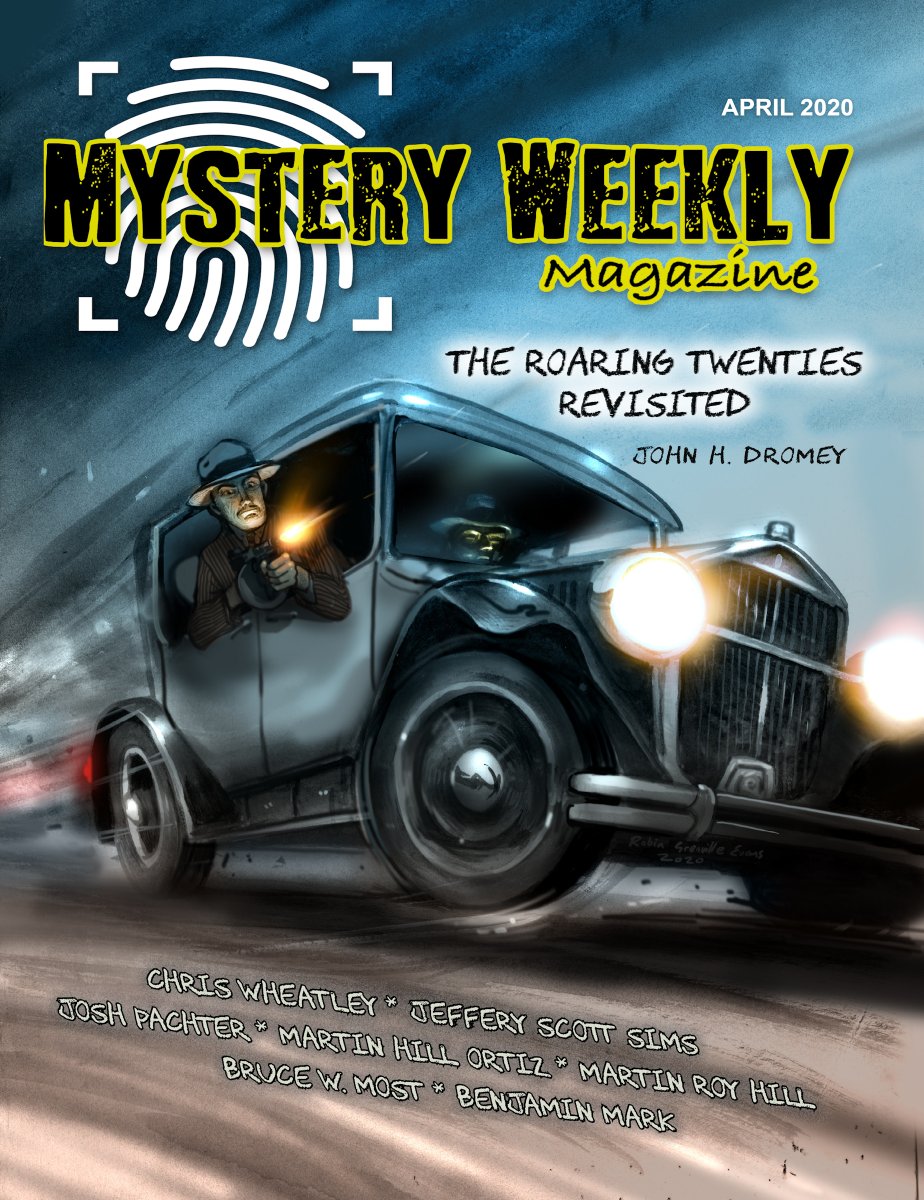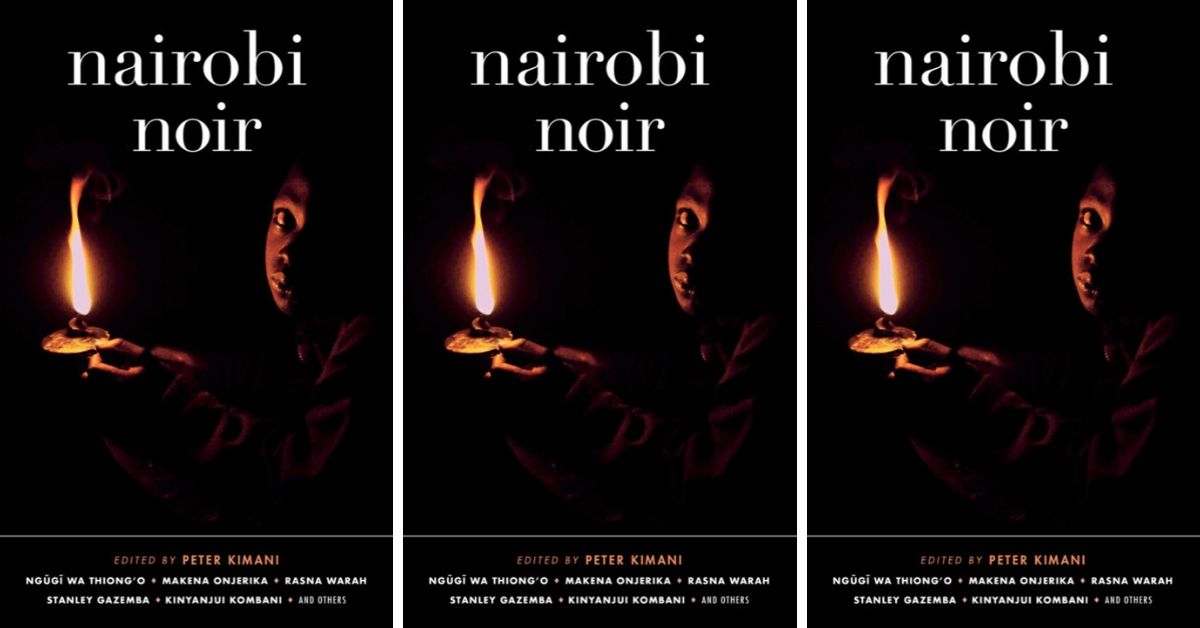"Mixed Identities," by Martin Hill Ortiz, in Mystery Weekly Magazine, April 2020.
I'm glad I am not on the committee who has to decide if this story is eligible for the Shamus Award for best private eye story.
Our narrator is in a cabin in Northern California and a man has broken in and lies on the floor: "He had spilt enough blood to fill jumbo jar of Ragu." His name is Buddy Dale and he thinks our narrator is the private eye who owns the cabin.
Luckily for him, the man who finds him is just a friend who is borrowing the P.I.'s cabin. Lucky because the friend is a paramedic who knows how to stop the bleeding.
But Buddy has something else on his mind, perhaps more important than staying alive. He's an ex-bank robber and someone has been copying his M.O., hoping to pin a series of crimes on him and send him back to prison for life.
Can our paramedic friend solve the crime? Clever story.
Monday, April 13, 2020
Sunday, April 5, 2020
Cold Blue Steel and Sweet Fire, by Donna Andrews
"Cold Blue Steel and Sweet Fire," by Donna Andrews, in The Beat of Black Wings, edited by Josh Pachter, Untreed Reads, 2020.
All the stories in this book are inspired by Joni Mitchell songs. I must admit I didn't remember this song. It ain't bad.
Our narrator is a homeless man. That's not his biggest problem, though. He's trying to stay away from the others.
Who are THEY? Not sure it would help even I knew [sic]. I think it' a what, not a who, but I don't know. Sometimes I'm tempted to call them the Fae. I'm sure they're behind these legends....
So, yeah the guy has problems. He says that the others try to take over people. When they fail, you find the body. When they succeed, the empty shell keeps walking around with one of them in it.
Well, that certainly creeped me out.
He figures his best protection is his knife because, as everyone knows, fairies hate iron and steel. And knives can come in useful in other ways, can't they? They do in this classy tale.
All the stories in this book are inspired by Joni Mitchell songs. I must admit I didn't remember this song. It ain't bad.
Our narrator is a homeless man. That's not his biggest problem, though. He's trying to stay away from the others.
Who are THEY? Not sure it would help even I knew [sic]. I think it' a what, not a who, but I don't know. Sometimes I'm tempted to call them the Fae. I'm sure they're behind these legends....
So, yeah the guy has problems. He says that the others try to take over people. When they fail, you find the body. When they succeed, the empty shell keeps walking around with one of them in it.
Well, that certainly creeped me out.
He figures his best protection is his knife because, as everyone knows, fairies hate iron and steel. And knives can come in useful in other ways, can't they? They do in this classy tale.
Sunday, March 29, 2020
The Night Beat, by Ngumi Kibera
"The Night Beat," by Ngumi Kibera, in Nairobi Noir, edited by Peter Kimani, Akashic Press, 2020.
Akashic Press sent me an advance reader copy of this book.
Let's review the basics, shall we? The basics of noir is this: a Nobody gets involved in crime in hopes of becoming a Somebody. For this act of hubris the universe curb-stomps him or her.
That's what it's all about and we have a pretty good sample here today.
The sergeant and the corporal are two cops assigned to night duty, which is a drag because there are so few opportunities for graft. What there are is a ton of minor infractions which the newly-minted corporal is eager to pursue. The wise old sergeant considers them a waste of energy.
"Corporal, try to remember that this is not Kilimani or those other uppity areas where you book drunks for pissing on fences. We are here for the REAL bad guys."
And sure enough, bad guys arrive, bringing with them an opportunity for graft that may well turn the lives of these officers upside-down. Watch out for that possible curb-stomping, however...
One note. Akashic Press books tend to be damn near free of typos but this book had several of the Spellcheck-can't catch variety. Not usually important, but in this tale there is a doozie. If your characters are usually referred to as the sergeant and the corporal, you don't want to reverse them, especially at the beginning of a flashback...
Akashic Press sent me an advance reader copy of this book.
Let's review the basics, shall we? The basics of noir is this: a Nobody gets involved in crime in hopes of becoming a Somebody. For this act of hubris the universe curb-stomps him or her.
That's what it's all about and we have a pretty good sample here today.
The sergeant and the corporal are two cops assigned to night duty, which is a drag because there are so few opportunities for graft. What there are is a ton of minor infractions which the newly-minted corporal is eager to pursue. The wise old sergeant considers them a waste of energy.
"Corporal, try to remember that this is not Kilimani or those other uppity areas where you book drunks for pissing on fences. We are here for the REAL bad guys."
And sure enough, bad guys arrive, bringing with them an opportunity for graft that may well turn the lives of these officers upside-down. Watch out for that possible curb-stomping, however...
One note. Akashic Press books tend to be damn near free of typos but this book had several of the Spellcheck-can't catch variety. Not usually important, but in this tale there is a doozie. If your characters are usually referred to as the sergeant and the corporal, you don't want to reverse them, especially at the beginning of a flashback...
Saturday, March 21, 2020
Plot Ten, by Caroline Mose
"Plot Ten," by Caroline Mose, in Nairobi Noir, edited by Peter Kimani, Akashic Press, 2020.
Akashic Press sent me an advance reader copy of this book.
I confess I don't tend to enjoy books in this series set in third world countries as much as others. Might be first world privilege speaking but I suspect it may have to do with some of these nations having less of a tradition of mystery writing. A lot of the stories, even when they have a crime prominently in them, don't feel to me like crime stories. They feel, dare I say it, mainstream.
This story, on the other hand, works just fine for me. It is, in fact, a type of whodunit.
The narrator, a high school girl, lives in Plot 10, a neighborhood of ten small houses served by one latrine. Both the neighborhood and the latrine are kept locked so when the narrator's friend is found butchered in the latter we have a sort of locked room mystery on our hands.
The police arrive and are as vicious as you might fear. Is the crime solved?
Well. That's an interesting question.
Daryl Gregory once said: "Stop just short of the ending. If you act like Tom Sawyer and let your readers do the rest of the work, they'll be more connected to the story, and thank you for it."
That is more or less what happens here. Ms. Mose provides all the clues but leaves it to the reader to connect the pieces. I thank her for it. It's a very interesting story.
Akashic Press sent me an advance reader copy of this book.
I confess I don't tend to enjoy books in this series set in third world countries as much as others. Might be first world privilege speaking but I suspect it may have to do with some of these nations having less of a tradition of mystery writing. A lot of the stories, even when they have a crime prominently in them, don't feel to me like crime stories. They feel, dare I say it, mainstream.
This story, on the other hand, works just fine for me. It is, in fact, a type of whodunit.
The narrator, a high school girl, lives in Plot 10, a neighborhood of ten small houses served by one latrine. Both the neighborhood and the latrine are kept locked so when the narrator's friend is found butchered in the latter we have a sort of locked room mystery on our hands.
The police arrive and are as vicious as you might fear. Is the crime solved?
Well. That's an interesting question.
Daryl Gregory once said: "Stop just short of the ending. If you act like Tom Sawyer and let your readers do the rest of the work, they'll be more connected to the story, and thank you for it."
That is more or less what happens here. Ms. Mose provides all the clues but leaves it to the reader to connect the pieces. I thank her for it. It's a very interesting story.
Sunday, March 15, 2020
What Mr. Leonard Said, by Andrew Welsh-Huggins
"What Mr. Leonard Said," by Andrew Welsh-Huggins, in Mystery Weekly Magazine, March 2020.
People have told the narrator all his life that he was stupid. His voice doesn't convince me of that, but he certainly sees the world a little differently than us.
When the only teacher whoever took an interest in him disappears he takes an interest in her cheating husband. And he knows enough from TV dramas to figure out a way to get the husband to reveal his guilt.
It turns out that if you have no compunctions about killing people, you can discover a lot of people who need killing.
I don't care much for the coincidental structure wrapped around the story, but our protagonist is a very interesting guy to spend some time with.
People have told the narrator all his life that he was stupid. His voice doesn't convince me of that, but he certainly sees the world a little differently than us.
When the only teacher whoever took an interest in him disappears he takes an interest in her cheating husband. And he knows enough from TV dramas to figure out a way to get the husband to reveal his guilt.
It turns out that if you have no compunctions about killing people, you can discover a lot of people who need killing.
I don't care much for the coincidental structure wrapped around the story, but our protagonist is a very interesting guy to spend some time with.
Sunday, March 8, 2020
A Little Help From My Friend, by John Dobbyn
"A Little Help From My Friend," by John Dobbyn, in Ellery Queen's Mystery Magazine. March/April 2020.
A quickie this week, although I don't think it quite fits under the line for flash fiction.
John wakes up in the hospital and realizes someone tried to kill him and almost succeeded. He is almost helpless but he has one surprising ally. You see, John writes private eye novels, and his star character, Mickey O'Casey, is determined to keep him alive to write more books.
Can a wounded author and a fictional hero work together to figure out whodunit? This is a very clever story.
One thing: Dobbyn could have used a little help from his editor. There's a glitch I will explain in a comment.
A quickie this week, although I don't think it quite fits under the line for flash fiction.
John wakes up in the hospital and realizes someone tried to kill him and almost succeeded. He is almost helpless but he has one surprising ally. You see, John writes private eye novels, and his star character, Mickey O'Casey, is determined to keep him alive to write more books.
Can a wounded author and a fictional hero work together to figure out whodunit? This is a very clever story.
One thing: Dobbyn could have used a little help from his editor. There's a glitch I will explain in a comment.
Sunday, March 1, 2020
Night Train to Berlin, by WIlliam Burton McCormick
"Night Train to Berlin," by William Burton McCormick. Alfred Hitchcock's Mystery Magazine, March/April 2020.
This is McCormick' fourth appearance here, and it's quite a change. The others were humorous stories but this one is sheer suspense.
It is 1939 and Stalin and Hitler are playing footsie. As part of their nice-making the Soviet Union and Nazi Germany are exchanging prisoners.
Our narrator is a German-born Communist named Moller. He has lived in the USSR since its origin but is now being shipped back to his homeland in exchange for some unfortunate Russian the NKVD wants to get their hands on. He knows that the vehicle he is about to board "might as well be my funeral train." The Gestapo will soon torture him death.
But there are plots within plots on board that choo-choo, and an unlikely ally might be able to help him out.
I read this in one sitting, because I had to know it ended...
This is McCormick' fourth appearance here, and it's quite a change. The others were humorous stories but this one is sheer suspense.
It is 1939 and Stalin and Hitler are playing footsie. As part of their nice-making the Soviet Union and Nazi Germany are exchanging prisoners.
Our narrator is a German-born Communist named Moller. He has lived in the USSR since its origin but is now being shipped back to his homeland in exchange for some unfortunate Russian the NKVD wants to get their hands on. He knows that the vehicle he is about to board "might as well be my funeral train." The Gestapo will soon torture him death.
But there are plots within plots on board that choo-choo, and an unlikely ally might be able to help him out.
I read this in one sitting, because I had to know it ended...
Subscribe to:
Comments (Atom)







